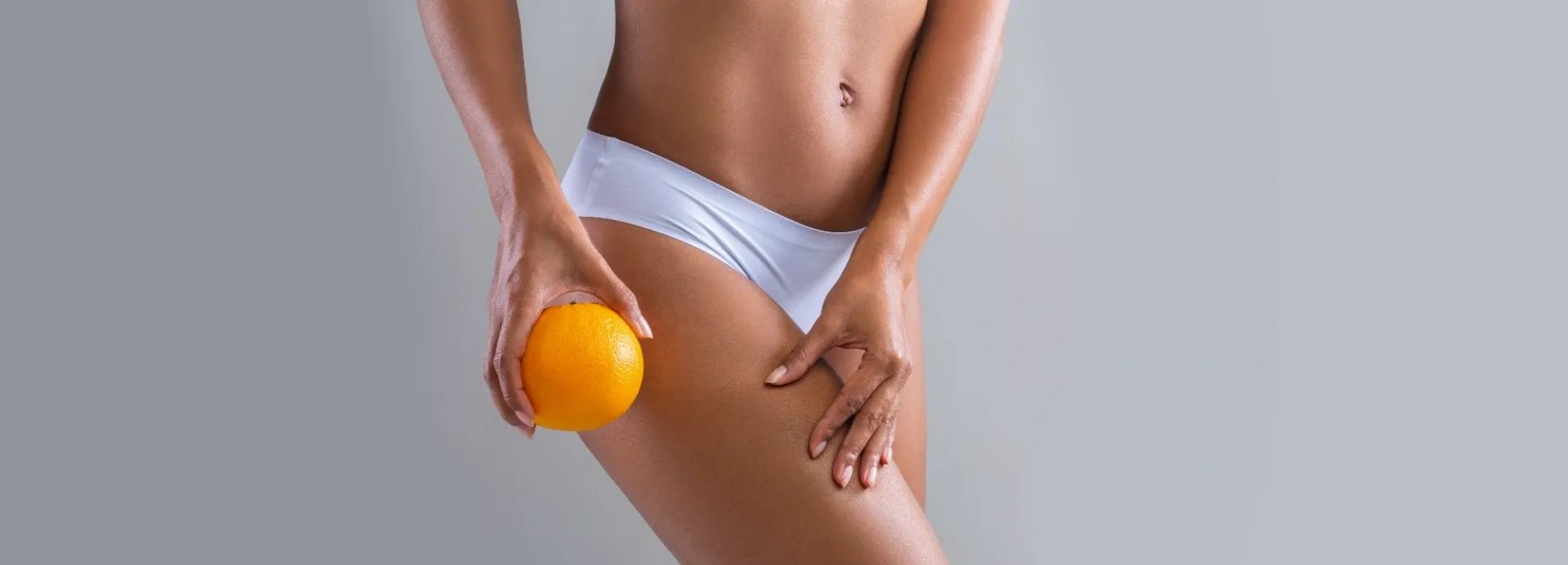Natural strategies for flaccid cellulite
Soft cellulite is a very common condition affecting the appearance of the skin on the thighs, buttocks, and abdomen. Unlike firmer cellulite, this variant is characterized by a more “cushioned” and flaccid texture.
What Is soft cellulite?
Soft cellulite, also called flaccid cellulite, is distinguished by skin that gives way to the touch and shows small, irregular dimples commonly known as “orange peel” skin. It’s often more noticeable when sitting or pressing the area, due to:
- Fluid retention: Accumulation of fluids in the subcutaneous tissue that worsens flaccidity.
- Weak connective tissue tension: Collagen and elastin don’t support fat cells effectively.
- Slow microcirculation: Insufficient blood flow hinders toxin removal.
Differences from hard cellulite
- Texture: Hard cellulite is compact and tense; soft is spongy.
- Pain on touch: Hard cellulite can hurt; soft rarely does.
- Feel: The hard type feels rigid; the flaccid type feels gummy.
Contributing factors
- Genetics & hormones: Family predisposition and hormonal changes (estrogens increase vascular permeability).
- Sedentary lifestyle: Lack of exercise slows microcirculation.
- Poor diet: High-salt and high-sugar diets promote fluid retention.
- Age: Collagen production decreases over the years.
Natural treatments for cellulite
Before turning to clinics or professional devices, it’s crucial to improve daily habits. These methods require consistency but offer overall benefits.
Diet to reduce flaccidity
- Diuretic foods: Pineapple, watermelon, celery, and cucumber help drain fluids.
- Antioxidants: Berries and citrus fruits provide vitamin C, essential for collagen synthesis.
- Lean proteins: Fish, legumes, and chicken support tissue regeneration.
- Omega-3 fatty acids: Olive oil, salmon, and walnuts keep skin hydrated from within.
- Limit salt and sugars: Reduce inflammation and swelling.
Sport & Exercise
Exercise boosts circulation and strengthens the underlying muscle system.
Key Exercises
- Dynamic planks: Improve core strength and raise body temperature.
- Squats and lunges: Tone thighs and buttocks.
- Glute bridge: Targets the posterior chain and lower back.
Recommendations
- Frequency: At least 3 times per week, combining cardio and strength training.
- Duration: 30–45 minutes per session.
- Intensity: Moderate to high, progressing as fitness improves.
Medical and aesthetic procedures for Cellulite
When habit changes aren’t enough, professional treatments can deliver faster results.
Radiofrequency & focused ultrasound
- How they work: Heat deeper layers to stimulate collagen production.
- Sessions: 4 to 8, spaced 2–4 weeks apart.
- Results: Increase firmness by 20 %–30 % after a full cycle.
Carboxytherapy & Mesotherapy
- Carboxytherapy: CO₂ injections that reactivate microcirculation.
- Mesotherapy: Microinjections of vitamins, collagen, and amino acids.
- Course: 8–12 sessions, every 7–10 days.
Long-Term Prevention & Maintenance
Consistency is key to minimizing recurrence of soft cellulite.
Healthy Habits
- Hydration: 1.5–2 L of water per day.
- Balanced diet: Rich in fiber, vegetables, and proteins.
- Regular exercise: Combine cardio, strength training, and stretching.
Skin-Care Routine
- Weekly exfoliation: Removes dead cells and improves cream absorption.
- Daily firming creams: Consistent use is crucial for results.
- Sun protection: Prevents collagen breakdown.
Professional Follow-Up
A semi-annual evaluation with an aesthetic medicine specialist helps adjust treatments and prevent worsening.
Frequently asked questions
What’s the difference between soft and hard cellulite?
What’s the difference between soft and hard cellulite?
Soft cellulite is more flaccid, with a “spongy” texture and no pain on touch. Hard cellulite feels rigid and can be painful.
How long before results show?
How long before results show?
With a good regimen, initial changes can appear in 6–8 weeks; professional treatments speed up the process.
Can cellulite be completely eliminated?
Can cellulite be completely eliminated?
Achieving 100 % removal is difficult. With consistency and a combination of methods, appearance can improve by 70 %–80 %.
Do contraceptives affect cellulite?
Do contraceptives affect cellulite?
Some hormonal formulas may promote fluid retention. Consult your gynecologist if you notice worsening after starting a method.


